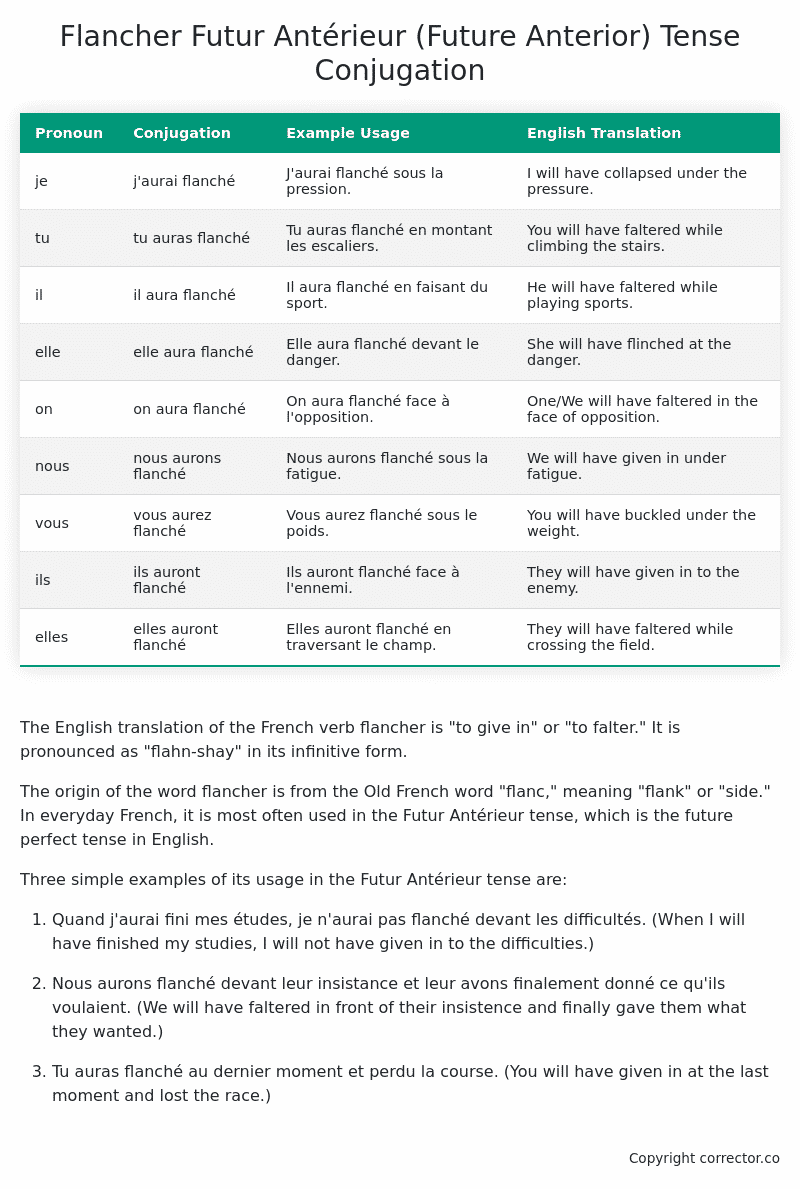Futur Antérieur (Future Anterior) Tense Conjugation of the French Verb flancher
Introduction to the verb flancher
The English translation of the French verb flancher is “to give in” or “to falter.” It is pronounced as “flahn-shay” in its infinitive form.
The origin of the word flancher is from the Old French word “flanc,” meaning “flank” or “side.” In everyday French, it is most often used in the Futur Antérieur tense, which is the future perfect tense in English.
Three simple examples of its usage in the Futur Antérieur tense are:
-
Quand j’aurai fini mes études, je n’aurai pas flanché devant les difficultés. (When I will have finished my studies, I will not have given in to the difficulties.)
-
Nous aurons flanché devant leur insistance et leur avons finalement donné ce qu’ils voulaient. (We will have faltered in front of their insistence and finally gave them what they wanted.)
-
Tu auras flanché au dernier moment et perdu la course. (You will have given in at the last moment and lost the race.)
Table of the Futur Antérieur (Future Anterior) Tense Conjugation of flancher
| Pronoun | Conjugation | Example Usage | English Translation |
|---|---|---|---|
| je | j’aurai flanché | J’aurai flanché sous la pression. | I will have collapsed under the pressure. |
| tu | tu auras flanché | Tu auras flanché en montant les escaliers. | You will have faltered while climbing the stairs. |
| il | il aura flanché | Il aura flanché en faisant du sport. | He will have faltered while playing sports. |
| elle | elle aura flanché | Elle aura flanché devant le danger. | She will have flinched at the danger. |
| on | on aura flanché | On aura flanché face à l’opposition. | One/We will have faltered in the face of opposition. |
| nous | nous aurons flanché | Nous aurons flanché sous la fatigue. | We will have given in under fatigue. |
| vous | vous aurez flanché | Vous aurez flanché sous le poids. | You will have buckled under the weight. |
| ils | ils auront flanché | Ils auront flanché face à l’ennemi. | They will have given in to the enemy. |
| elles | elles auront flanché | Elles auront flanché en traversant le champ. | They will have faltered while crossing the field. |
Other Conjugations for Flancher.
Le Present (Present Tense) Conjugation of the French Verb flancher
Imparfait (Imperfect) Tense Conjugation of the French Verb flancher
Passé Simple (Simple Past) Tense Conjugation of the French Verb flancher
Passé Composé (Present Perfect) Tense Conjugation of the French Verb flancher
Futur Simple (Simple Future) Tense Conjugation of the French Verb flancher
Futur Proche (Near Future) Tense Conjugation of the French Verb flancher
Plus-que-parfait (Pluperfect) Tense Conjugation of the French Verb flancher
Passé Antérieur (Past Anterior) Tense Conjugation of the French Verb flancher
Futur Antérieur (Future Anterior) Tense Conjugation of the French Verb flancher (this article)
Subjonctif Présent (Subjunctive Present) Tense Conjugation of the French Verb flancher
Subjonctif Passé (Subjunctive Past) Tense Conjugation of the French Verb flancher
Subjonctif Imparfait (Subjunctive Imperfect) Tense Conjugation of the French Verb flancher
Subjonctif Plus-que-parfait (Subjunctive Pluperfect) Tense Conjugation of the French Verb flancher
Conditionnel Présent (Conditional Present) Tense Conjugation of the French Verb flancher
Conditionnel Passé (Conditional Past) Tense Conjugation of the French Verb flancher
L’impératif Présent (Imperative Present) Tense Conjugation of the French Verb flancher
L’infinitif Présent (Infinitive Present) Tense Conjugation of the French Verb flancher
Struggling with French verbs or the language in general? Why not use our free French Grammar Checker – no registration required!
Get a FREE Download Study Sheet of this Conjugation 🔥
Simply right click the image below, click “save image” and get your free reference for the flancher Futur Antérieur tense conjugation!

Flancher – About the French Futur Antérieur (Future Anterior) Tense
Construction
Common Everyday Usage Patterns
Interactions with Other Tenses
For example
Summary
I hope you enjoyed this article on the verb flancher. Still in a learning mood? Check out another TOTALLY random French verb conjugation!


